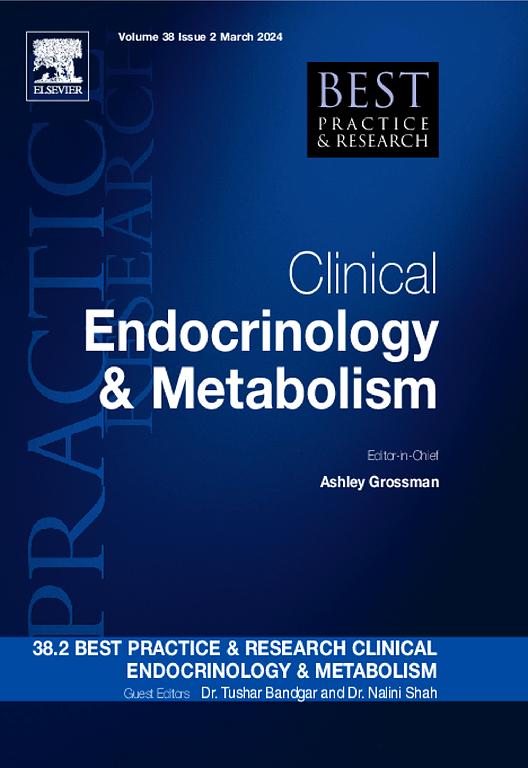外伤性脑损伤所致垂体功能减退的流行病学及危险因素。
IF 6.1
1区 医学
Q1 ENDOCRINOLOGY & METABOLISM
Best practice & research. Clinical endocrinology & metabolism
Pub Date : 2025-05-01
DOI:10.1016/j.beem.2025.101997
引用次数: 0
摘要
在过去的二十年中,创伤性脑损伤(TBI)也被发现是垂体功能低下的一个重要原因。虽然TBI最常见的原因是交通事故和跌倒,但其他原因,如爆炸相关的伤害、暴力行为和格斗运动也被认为是病因。创伤性脑损伤可导致短暂或永久性的垂体功能障碍。tbi诱发的垂体功能减退症的定义包括垂体激素水平的改变,这种改变即使在受伤五年后也可能发生,其特征是激素缺乏,但在疾病过程中很少有某些激素恢复。研究表明,5% %至70% %的TBI患者患有垂体功能减退症。患病率的巨大差异可能是由于不同研究中使用的不同诊断标准、创伤后干预的不同时间点、创伤的严重程度等原因造成的。高龄、格拉斯哥昏迷评分低、需要重症监护、存在颅骨骨折、脑水肿的患者尤其容易发生脑外伤引起的垂体功能减退。本文章由计算机程序翻译,如有差异,请以英文原文为准。
Epidemiology and risk factors for hypopituitarism due to traumatic brain injury
During the last two decades traumatic brain injury (TBI) was also found as an important cause of hypopituitarism. Although the most common causes of TBI are traffic accidents and falls, others such as blast-related injuries, acts of violence and combative sports are also considered in the etiology. TBI may lead to transient or permanent pituitary dysfunction. The definition of TBI-induced hypopituitarism cover alterations in pituitary hormone levels which may occur even after five years of injury and characterised by hormonal deficiencies but rarely recovery of some hormones during the course of the disease. It has been shown that between 5 % and 70 % of the TBI patients suffer from hypopituitarism. This large variation in the prevalence may be explained by diverse diagnostic criteria used in different studies, different time points of interventions after TBI, severity of trauma etc. Patients with advanced age, low Glasgow Coma Scale, needing intensive care unit stay, presence of skull fractures, brain edema are particularly make patients vulnerable to TBI-induced hypopituitarism.
求助全文
通过发布文献求助,成功后即可免费获取论文全文。
去求助
来源期刊
CiteScore
11.90
自引率
0.00%
发文量
77
审稿时长
6-12 weeks
期刊介绍:
Best Practice & Research Clinical Endocrinology & Metabolism is a serial publication that integrates the latest original research findings into evidence-based review articles. These articles aim to address key clinical issues related to diagnosis, treatment, and patient management.
Each issue adopts a problem-oriented approach, focusing on key questions and clearly outlining what is known while identifying areas for future research. Practical management strategies are described to facilitate application to individual patients. The series targets physicians in practice or training.

 求助内容:
求助内容: 应助结果提醒方式:
应助结果提醒方式:


